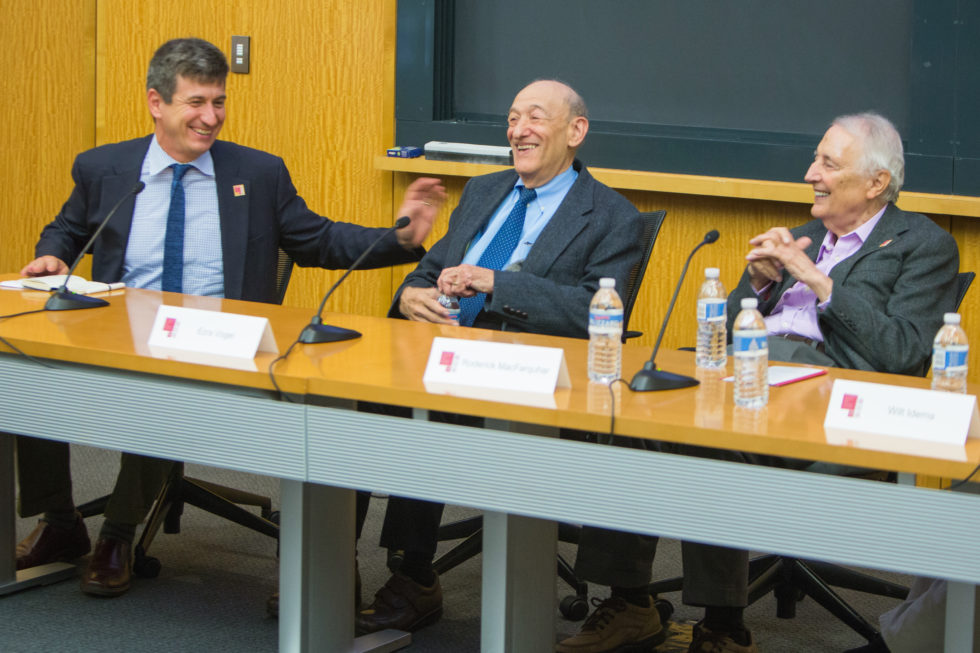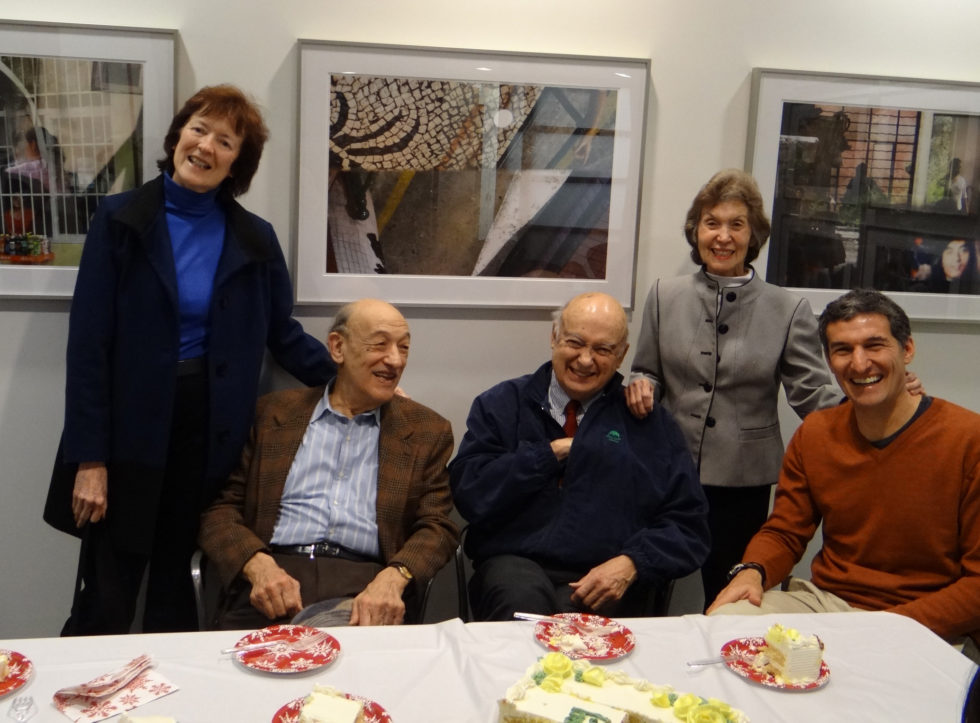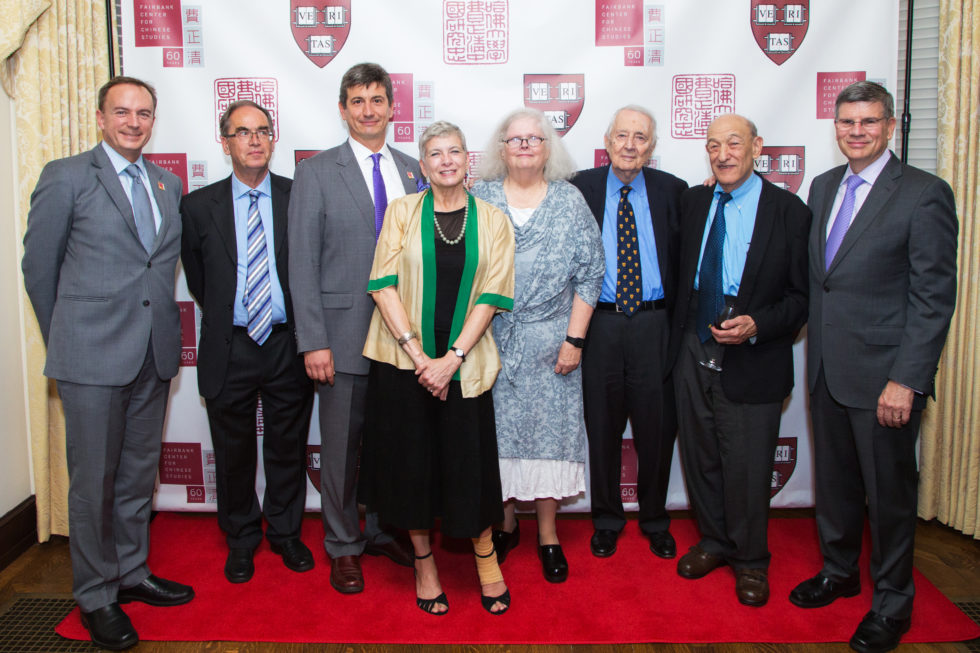We are sad to announce the passing of our former director, Professor Ezra F. Vogel (1930 – 2020)
It is with great sadness that we announce the passing of our beloved former director, colleague and friend Ezra F. Vogel (1930-2020), Henry Ford II Professor of the Social Sciences, Emeritus, at Harvard University. He passed away on Sunday, December 20, 2020 at Mt Auburn Hospital in Cambridge, MA, at the age of 90, due to complications from surgery.
From 1973-1975, Professor Vogel served as the second director of the East Asian Research Center, which was founded in 1955 and later renamed the Fairbank Center in honor of its founding director, Professor John King Fairbank. Professor Vogel served as director again from 1995-99.
He graduated from Ohio Wesleyan University (B.A.) in 1950 and then Harvard University (Ph.D. Sociology) in 1958, after which he then spent two years conducting fieldwork in Japan. He was Assistant Professor at Yale University from 1960-61 and a post-doctoral fellow at Harvard University from 1961-64, studying Chinese language and history. He became a lecturer at Harvard in 1964 and a professor in 1967.

Professor Vogel made remarkable contributions to the study of East Asia. The breadth of research covered the entirety of East Asia, to which he brought not only a deep knowledge and understanding of each country, but also an understanding of the region’s political, economic, and cultural interconnectedness. His many books highlight his multifaceted intellectual endeavors and include: Japan’s New Middle Class; Canton Under Communism; Japan as Number One: Lessons for America; Comeback, Case by Case: Building the Resurgence of American Business; One Step Ahead in China: Guangdong Under Reform; The Four Little Dragons: The Spread of Industrialization in East Asia; Deng Xiaoping and the Transformation of China; and most recently, China and Japan: Facing History. The Japanese edition of Japan as Number One: Lessons for America (1979) remains the all-time best-seller in Japan of non-fiction by a Western author.
Professor Vogel contributed extensively to building institutions that would support generations of scholars and practitioners with an interest in East Asia. Beyond the Fairbank Center, he served as the second Chairman of Harvard’s Council for East Asian Studies (1977-1980) and director of the Undergraduate Concentration in East Asian Studies from its inception in 1972 until 1989. In 1980, he served as the founding Director of the Harvard Program on U.S.-Japan Relations at the Weatherhead Center for International Affairs, where he served until 1987, and then as honorary director until his passing.
In 1993 he took a two-year leave of absence from Harvard to serve as a National Intelligence Officer for East Asia at the National Intelligence Council during the Clinton Administration. On his return to Harvard, he served as both Director of the Fairbank Center (1995-1999) and as the founding director of the Harvard University Asia Center, from 1997-1999, a center that he envisioned as supporting transnational and transregional studies of the Asian continent.

recent years, he remained an active and enthusiastic member of the Fairbank Center community, organizing a weekly “Critical Issues Confronting China” lecture series, hosting visitors at the Center and at his nearby home, and regularly traveling to East Asia to engage with scholars in the region.
Ever the optimist, Professor Vogel was an advocate for improving mutual understanding between the U.S. and China. We are sure that it would be Ezra’s wish that we commemorate him by working to improve the US-China relationship in ways that are beneficial to the peoples of both countries.
Above all, Professor Vogel will be remembered for his kindness, generosity, patience, and devotion to teaching. He always described himself as a student first and a teacher second. Writing in The Japan Times, Professor Vogel’s son, Steven, writes that he “will be most remembered for his boundless good cheer and boyish enthusiasm.”
Professor Mark C. Elliott, former Fairbank Center Director and current Vice-Provost for International Affairs at Harvard University, writes that Professor Vogel’s passing is “a huge loss to Harvard and to Asian studies everywhere.”
Ezra Vogel was a true champion of the Fairbank Center, an erudite scholar, and a wonderful friend. He will be truly missed by all of us here at Harvard.
A memorial service honoring Ezra’s life will held at an appropriate time in the new year.

深切缅怀哈佛大学傅高义教授 (EZRA F. VOGEL)
纪念傅高义教授,1930-2020
哈佛大学荣誉退休教授、著名中国问题学者傅高义逝世,享年90岁。外交部发言人汪文斌提到,傅高义教授是美国著名中国问题专家,是中国人民的老朋友,为促进中美沟通与交流、增进两国人民相互了解作出了不懈努力。“我们将铭记他为推动中美关系发展所作的贡献。”
我们怀着悲痛的心情宣告,我们挚爱的前主任、同事和朋友傅高义(Ezra F. Vogel,1930-2020年),哈佛大学亨利·福特二世社会科学荣誉退休教授,于2020年12月20日星期日在马萨诸塞州坎布里奇的奥本山医院因手术并发症不治逝世,享年90岁。
1973年至1975年,傅高义教授曾担任哈佛大学东亚研究中心的第二任主任。东亚研究中心成立于1955年,后来为了纪念创始主任费正清教授(John King Fairbank)而更名为费正清中心。傅高义教授于1995-99年再次担任主任。
傅高义教授1950年本科毕业于俄亥俄州的卫斯理大学,1958年毕业于哈佛大学,获社会学博士学位。此后他在日本进行了两年实地考察。他在1960-61年担任耶鲁大学助理教授,并于1961-64年在哈佛大学任博士后研究员,研究汉语和历史。此后,他于1964年成为哈佛大学的讲师,并于1967年成为教授。
傅高义教授为东亚研究做出了杰出贡献。他的研究范围涵盖整个东亚,不但倾注了他对每个国家的深刻了解,更包含了他对该地区政治、经济和文化相互关联的认识。他的许多著作都体现了多方面知识探索,包括:《日本新中产阶级》、《共产主义下的广州》、《日本第一:对美国的启示》、《卷土重来:建立美国商业复兴》、《先行一步:改革中的广东》、《亚洲四小龙:东亚的工业化》、《邓小平时代》,以及最新的《中国和日本:面对历史》。日文版的《日本第一:对美国的启示》(1979年)是至今最畅销的西方作家在日本出版的非虚构类书籍。
傅高义教授不遗余力地推动建立机构来支持对东亚感兴趣的几代学者和实践者。除了费正清中心之外,他还是哈佛大学东亚研究理事会第二任主席(1977-1980),并从1972年哈佛大学本科东亚研究专业创立至1989年担任主任。1980至1987年,他曾在魏德海国际事务中心(Weatherhead Center for International Affairs)担任哈佛大学美日关系项目的创始主任,并在此后一直担任名誉主任直到逝世。
1993年,在克林顿政府执政期间,傅高义教授从哈佛离职两年,到美国国家情报委员会担任东亚情报官。重返哈佛后,他担任费正清中心主任(1995-1999年)和哈佛大学亚洲中心的创始主任(1997年至1999年),按照他的设想,该中心将支持亚洲地区的跨国和跨区域研究。
近年来,傅高义教授一直是费正清中心大社区的活跃成员,每周组织一次“中国面临的关键问题”系列讲座、在中心及其附近家中接待访客,并定期前往东亚与当地的学者交流。
作为一位乐观主义者,傅高义教授始终倡导增进中美之间的相互了解。我们相信,傅高义教授希望我们纪念他的方式就是推动改善中美关系,让两国人民共赢。
最重要的是,傅高义教授的善良、慷慨、耐心,和对教学的奉献精神,将永远被铭记。他总说自己首先是一位学生,然后才是老师。他的儿子史蒂芬在《日本时报》上写道:“他无限的乐观和孩子般的热情将令人深刻怀念”。
费正清中心前主任、现哈佛大学国际事务副教务长欧立德教授(Mark C.Elliott)写道,傅高义教授的逝世是“哈佛和整个亚洲研究界的巨大损失”。
傅高义教授是费正清中心的真正卫道者,是一位渊博的学者,也是一位挚友。哈佛的每个人都将深深怀念他。
傅高义教授的追悼会将在新的一年里择时举行。